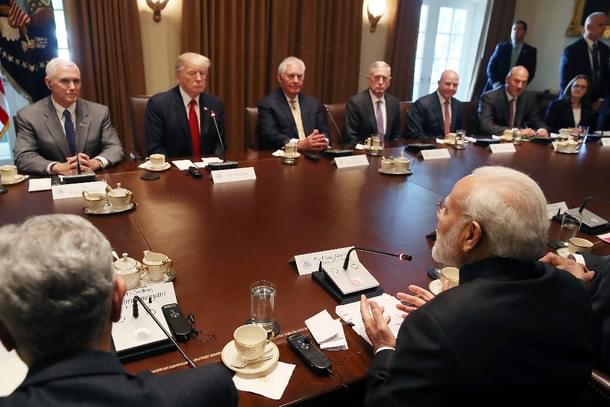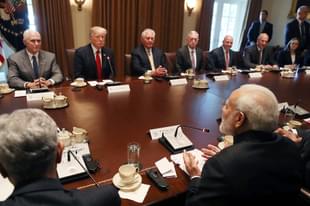Politics
Explained: What Is Data Localisation And Why Is The US Against India Pushing For It?
Prakhar Gupta
Jun 20, 2019, 10:25 PM | Updated 10:25 PM IST
Save & read from anywhere!
Bookmark stories for easy access on any device or the Swarajya app.


Trade tensions between India and the United States is not new news. Even as the convergence between the two on issues of security, and more specifically, on managing China’s rise, has increased, the differences on trade have only grown. In fact, under the Donald Trump administration, US’ appetite to digest some trade restrictions has decreased, thanks to the ‘America first’, and it appears that the mechanism the two countries had evolved under previous administrations in Washington to manage these disputes is no longer working.
In the latest round of tensions, India has imposed tariffs on 28 items exported from the US in reaction to Washington withdrawing the Generalised System of Preferences for India that allowed duty-free export of over 3,000 products from the country. These tariffs, proposed originally in response to the US’ tariff on steel and aluminium imports, were delayed multiple times before.
Just days later, the US has upped the ante against India’s data localisation rule. The Trump administration is reportedly planning to cap H-1B visas issued each year to Indians at between 10 to 15 per cent of the annual quota to deter India from enforcing data localisation rules. The H-1B visa programme allows companies to bring skilled workers from other countries into the US, and, hence, is a source of jobs for thousands of Indians. Around 85,000 H-1B visas are granted each year, and Indians receive around 70 per cent of these.
What Is Data Localisation?
Every time one swipes a Visa card for a payment, or, for that matter, uses Amazon’s services, financial and personal information generated in the process is stored in servers outside India. In 2018, based on the recommendations of the Justice Srikrishna Committee, the Reserve Bank of India (RBI) has made it mandatory for fintech firms to store payments data of Indian citizens within the country. Under the rules put in place by the RBI, the data generated in India has to be stored and processed in India.
Data localisation is not only applicable on card payment services such as Visa and MasterCard but also on companies such as Paytm, WhatsApp and Google, which offer electronic or digital payment services in the country.
The RBI had set 15 October 2018 as the deadline for compliance. Multiple foreign firms, including credit card giants Visa and MasterCard, missed the deadline and expressed displeasure against the move. There has been intense lobbying against these norms but the RBI has not given in. It has also not imposed any fines or penalties on the firms that have failed to meet the deadline.
Why Does India Need Data Localisation?
With more and more Indians gaining access to smartphones and the Internet, the country is set to produce unparalleled amounts of data. Added to this is the fact that Indian smartphone users consume maximum data in the world at 9.8 gigabytes per month. Every activity of this growing force of Internet users will create digital traces. According to real estate and infrastructure consultancy, Cushman and Wakefield, around 40,000 petabytes of digital data was produced in India in 2010, and by 2020 it is likely to shoot up to 2.3 million petabytes, growing twice as fast as in other countries.
For companies, customer data is make or break. It has application in all aspects of business, from understanding consumer behaviour to predictive analytics. When used for business, it is a potent weapon but in the wrong hands, it can also become a means for illegal surveillance and even pose national security threats.
Making the storage of payments data in India mandatory has multiple benefits.
One, the availability of data within Indian borders gives the government and regulators the jurisdiction to call for it when required. This will be beneficial for law enforcement agencies in particular as they can scavenge it for proof in case of breach or threat. If it is stored outside India, access to this data will be restricted by local laws and Indian agencies will be dependent on the whims and fancies of the host-country governments for access.
Two, in case of data being stored in countries hostile to India, say China, it can become a tool for mass surveillance. In authoritarian countries, even private players have to work closely with the government, and in many cases, function as an arm of the state. Huawei, with its open links to the People’s Liberation Army, is an example.
Three, as the Justice Srikrishna Committee said, data localisation could also create domestic jobs and skills in data storage and analytics.
Why Is The US Against Data Localisation?
Before its latest effort to deter India’s data localisation, the US had called the policy a ‘significant barrier to digital trade’. And it has done so in support of US-based firms that are operating in India. Washington wants India to eliminate trade barriers for American companies to cut the cost of doing business in India.
Foreign firms are unwilling to comply as it would require them to spend money on infrastructure in the form of servers and buildings, and, of course, on employing local professionals to manage it. This will add to their operating costs. By some accounts, costs may go up by 10 to 50 per cent for some players.
How Will A Cap On H-1B Visa Help The US Deter India?
One, unable to take more Indian professionals to the US in sufficient numbers, Indian technology firms will have to hire onsite, which the credit-rating agency, ICRA (Investment Information & Credit Rating Agency) says will impact their margins. Of course, Indian firms, the largest beneficiaries of the H-1B visa scheme, would not want this to happen and will be more inclined than before to lobby against the data localisation policy. Many Indian firms had supported data localisation when it was announced by the RBI last year. Therefore, by signalling that it is mulling caps on H-1B visas, the US is effectively forcing Indian firms to lobby against the data localisation policy.
Two, it will force the Indian government to reconsider the policy as the question of Indians loosing job opportunities comes into the picture.
Prakhar Gupta is a senior editor at Swarajya. He tweets @prakharkgupta.





